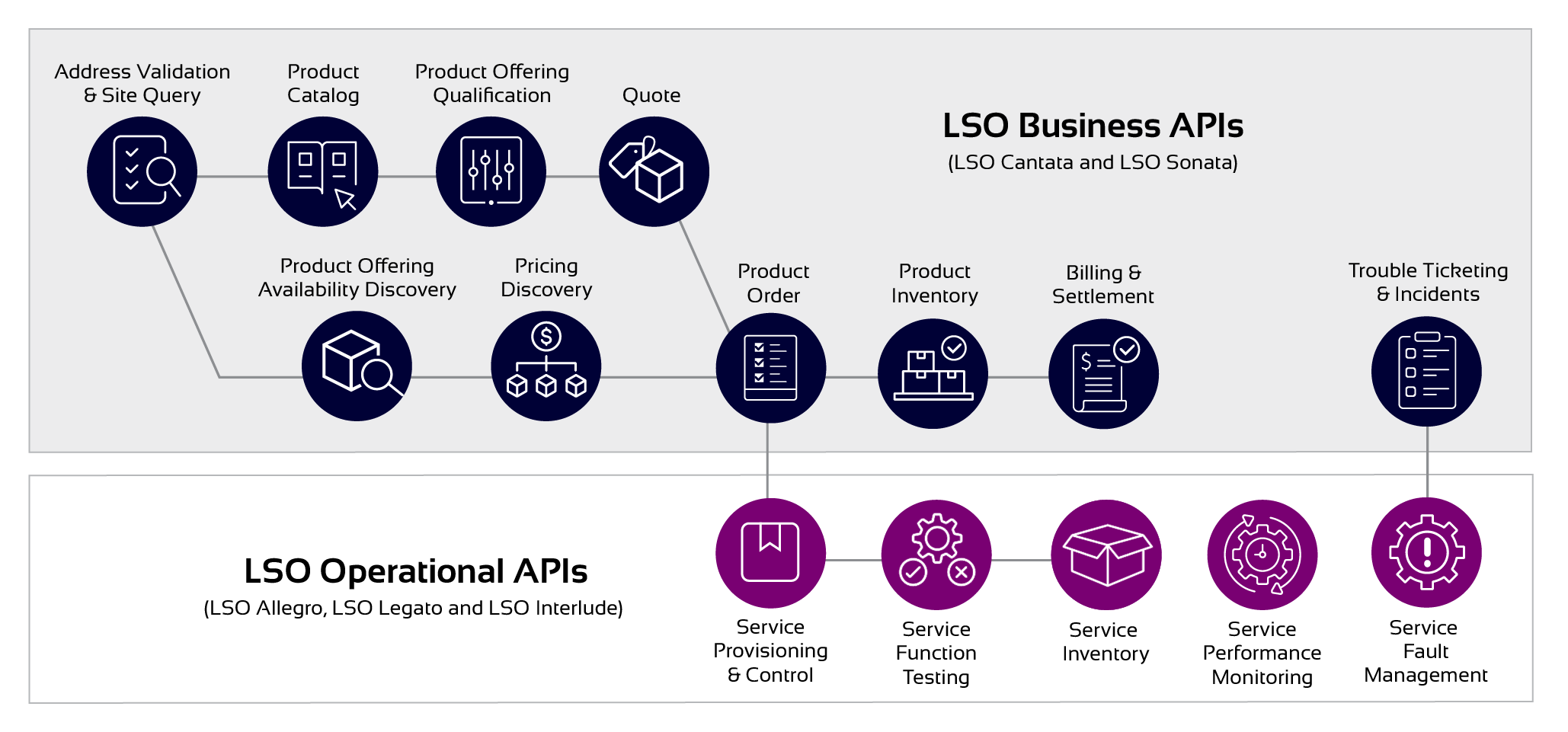LSO Operational APIs enable sellers of services to share key elements of the lifecycle of a service with their buyer customers, once it has been ordered and provisioned, all the way through to its decommissioning.
LSO APIs for operational automation improve the user experience by providing automated visibility into, and control of, “in-flight” services with the absolute minimum of manual interaction with the seller.
MEF’s open-standard LSO Operational APIs are implemented at one or more of three interface reference points in the LSO Framework—LSO Allegro, LSO Interlude, and LSO Legato.
LSO Operational APIs at the LSO Allegro, LSO Interlude, and LSO Legato references points automate the following Carrier Ethernet, IP and SD-WAN service functionalities:
Each reference point includes supporting detailed business requirements, use cases, developer guides, APIs, and test requirements. Any of MEF’s LSO Service Payloads can be “blended” with these LSO APIs using the LSO Blending Tool in the MEF LSO Marketplace

Currently oriented only at the LSO Legato interface reference point, these APIs enable the business applications in the service provider to interact in an automated fashion with the internal operations systems for the following use cases:
By virtue of these LSO Operational APIs being open and standardized, service providers will have the option to use these APIs directly opposite both customers—via LSO Allegro—and downstream partners’ operational systems—via LSO Interlude. This is especially valuable when customers are requesting on-demand services and the ability to turn up and down bandwidth efficiently.
Once a Carrier Ethernet, IP or SD-WAN service is provisioned, the service provider needs to ensure that the service is functional. The open standard LSO service function testing (SFT) APIs at LSO Allegro, LSO Legato, and LSO Interlude enable service providers to carry out the following actions:
Service function testing is a key aspect of the user experience and therefore the use of the LSO Operational APIs—within the service provider, or directly opposite the customer or downstream partners—can provide differentiating value.
Currently available only at the LSO Legato interface reference point, these APIs enable the business applications in the service provider to interact in an automated fashion with the internal operations systems to retrieve information on services previously ordered via the service provider’s operations system.
The ability to monitor the performance of a service is important both to the service provider and to the customer. The suite of open standard LSO Service Performance Monitoring APIs enabling this visibility include:
These LSO Operational APIs when used at LSO Allegro, LSO Legato, and/or LSO Interlude are a valuable tool for service providers to improve the user experience and differentiate their offerings.
The fault management LSO APIs enable standardized diagnostic tools like link trace and loopback to be employed as part of a fault management ‘job’. Enabling access to this capability across one or more service providers using open standard LSO APIs can improve the customer experience significantly and reduce costly manual interactions between multiple stakeholders involved in providing a connectivity service.
Whether used separately or collectively for Carrier Ethernet, IP and/or SD-WAN services at LSO Allegro, LSO Legato and/or LSO Interlude, the LSO Operational APIs provide a powerful way for service providers to improve their customer experience as well as improving operational efficiency and differentiating their offerings.
Inter-provider APIs for automating operational functions east-west between companies’ respective business support systems (BSSs).
LSO Operational APIs enable sellers of services to share key elements of the lifecycle of a service with their buyer customers, once it has been ordered and provisioned, all the way through to its decommissioning.
The LSO APIs at LSO Allegro allow enterprise, application and developer customers to automate their operational interactions with their service provider partners for activities such as service change, performance monitoring and fault management.
The LSO APIs at LSO Interlude coordinate a portion of digital LSO services within the partner domain that are managed by a service provider’s Service Orchestration Functionality (SOF), within the bounds and policies defined for the service.
Through LSO Interlude, the SOF may request initiation of technical operations or dynamic control behavior associated with a service with a partner network domain. Such requests must be within the constraints set forth in the policies associated with established services and performed without impacting business applications.
Intra-provider APIs for automating operational functions north-south within the service provider, between its business support systems (BSS) and its operating support systems (OSS).
LSO Operational APIs also enable service providers to automate key elements of the lifecycle of a service internally, once it has been ordered and provisioned, all the way through to its decommissioning.
The LSO APIs at LSO Legato enable a service provider to map product processes in the business layer of its systems to service processes in the operational layer of its systems. LSO Legato APIs cover actions such as service change, performance management, and fault monitoring.
The LSO Allegro APIs facilitate interactions between the enterprise and its retail service provider at the OSS layer. The interface handles interactions like service change, performance monitoring and fault management of the MEF-standardized services provided to the enterprise by its retail service provider.
Explore LSO AllegroThe LSO Interlude APIs facilitate interactions between the respective OSS layers of the service provider and its downstream wholesale operator partner. The interface handles interactions like service change, performance monitoring and fault management of the MEF-standardized services provided to the service provider by its wholesale partner.
Explore LSO InterludeThe LSO Legato interface and APIs facilitate interactions between the business-applications layer and service-orchestration functionality within a service provider domain.
Explore LSO Legato